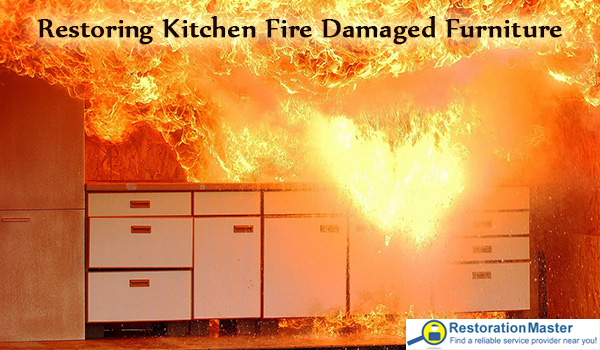Why You Should Reconsider Frying Your Thanksgiving Turkey
Fried foods are rich and tasty, and a deep-fried turkey is an explosion of flavor—literally. When looking to impress the family and guests this Thanksgiving, reconsider deep frying the traditional holiday bird.
Dunking a turkey in a vat of oil is convenient, with only a 45-minute cooking time, and outrageously delicious, with layers of crispy skin and sealed-in juices. It’s understandable that homeowners prefer deep frying the foul. Be aware, however, that danger lurks when deep frying a Thanksgiving turkey.
Dangers of Frying Thanksgiving Turkeys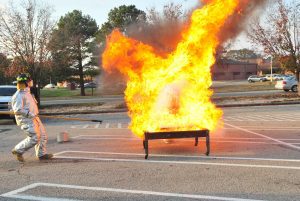
The number one danger of dropping a turkey into the hot oil bath is the risk of a cooking fire. The National Fire Protection Association reports that deep-fryer mishaps are responsible for $15 million in property damages annually. Plus, injuries and even deaths occur as a result of deep-fryer accidents.
Even the most careful consumer is at risk for fire hazards when operating turkey fryers. The NFPA advises against deep frying a turkey due to its glaring lack of safe usage. Home cooking fires spike on Thanksgiving, with fire departments responding to more fires on this day than any other.
What makes plunging a turkey into three to five gallons of oil such a catastrophic home fire risk? A single misstep can cause severe burns or deadly home fires. Reasons to avoid deep frying a turkey are many; but if it’s in the holiday plan, these solutions increase everyone’s safety.
1. Frozen Bird Explosion
Deep frying a frozen turkey is the biggest danger. Ice from an unthawed bird makes contact with the hot oil. The meeting of ice and hot oil creates steam, and this steam expands significantly. Oil bubbles over, falls onto the flames and ignites a fury of fire.
SolutionA solution is a homogeneous mixture of two or more substance... More: Thaw the Turkey
When deep frying a turkey, ensure the bird is fully thawed. For every four pounds of turkey, allow one day of thawing inside a refrigerator. Or, submerge the turkey in cold water; allow 30 minutes per pound to thaw. Pat dry the bird before frying.
2. Overfilled Fryer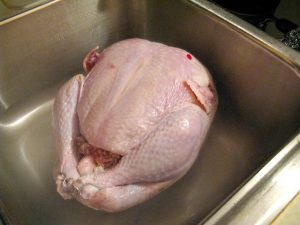
Deep fryers are designed to hold several gallons of hot oil. When an improper measurement of oil is heated inside, the chance of danger arises. As the turkey is lowered into the fryer, the oil inside spills out, especially when the fryer is overfilled.
SolutionA solution is a homogeneous mixture of two or more substance... More: Measure the Liquid
Knowing how much liquid a deep fryer holds is essential. Prior to filling the fryer with oil, fill it with water. Place the turkey in the water. If the water does not spill out, the amount is just right. Remove the water and replace with the same amount of oil.
3. Tipped-Over Fryer
Turkey fryers are notorious for tipping over. Imagine a 25-pound bird bubbling inside a fryer filled with five gallons of boiling oil. The whole fryer can tip over, resulting in serious injuries and fire damage in the immediate vicinity.
SolutionA solution is a homogeneous mixture of two or more substance... More: Use Fryer Outdoors
Take precaution and use the turkey fryer outdoors. The outdoor surface must be level and sturdy. Be sure to position the fryer away from flammable materials and buildings. Never use a turkey fryer on a wooden deck, inside a garage or in an enclosed area.
Implement a safe zone when using a turkey fryer. Create a three-foot safe area around the fryer to protect kids and pets from accidents and potential burns. Oil remains dangerously hot for hours even after cooking, so keep young people away from the fryer until the oil cools.
4. Combustion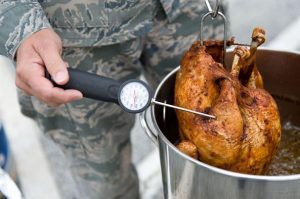
The oil inside an overheated deep fryer is susceptible to combustion. Overheated oil is a possibility, especially since most turkey fryers do not come equipped with an automatic thermostatA thermostat is a device that monitors and regulates tempera... More control. Without constant monitoringMonitoring is the ongoing observation and measurement of con... More of the oil temperature, ignition will occur.
SolutionA solution is a homogeneous mixture of two or more substance... More: Use a Thermometer
Probe thermometers can be attached to the fryer sides and checked often to ensure the oil does not overheat. These thermometers can be used when cooking to temperatures above 400 degrees Fahrenheit. They even sound alarms when preset temperature targets are reached.
5. Fryers Get Hot
The sides, handles and lid of the fryer can soar to dangerously high temperatures when bubbling with hot oil. Handling the fryer requires conscientiousness to avoid getting seriously scalded or burned. Placing the lid on the fryer accelerates the cooking process, but care is required to safely remove the lid.
SolutionA solution is a homogeneous mixture of two or more substance... More: Use Safety Gear
Be prepared with the proper safety gear when handling the fryer. Wear oven mitts or utilize potholders with hefty insulationInsulation is a material used in buildings to reduce the tra... More. Deep fry while wearing a shirt with long sleeves to protect the arms and upper torso. Goggles protect the face and eyes from splattering oil.
Since fryers filled with oil reach extremely hot temperatures that can burst into raging fires, keep an all-purpose fire extinguisher on hand. Be familiar with how to operate the extinguisher. Knowing the PASS technique (pull, aim, squeeze and sweep) will keep fires from getting out of control.
Fire Damage RestorationFire damage restoration is the process of repairing and rest... More on Thanksgiving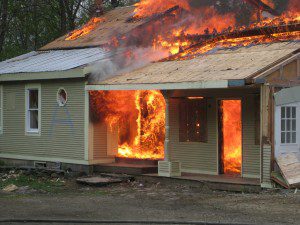
Despite best efforts to keep the family and friends safe while deep frying a Thanksgiving turkey, accidents happen. In the aftermath of a home cooking fire, make sure you call a reputable fire damage restoration service.
A crew of dedicated fire and smoke damage restoration technicians tackle the aftereffects of home fires. They will first assess the extent of damage, then remove all traces of sootSoot is fine black particles composed of carbon and other ma... More deposits, smoke particles and chemicals. All affected contents receive a thorough cleaning.
When the fire devastates a large portion of the home, fire damage restoration technicians work quickly to board up the premises or install tarping. Fires can leave the property a mess. They remove all debris from the property so homeowners can get back to normal as fast as possible.










